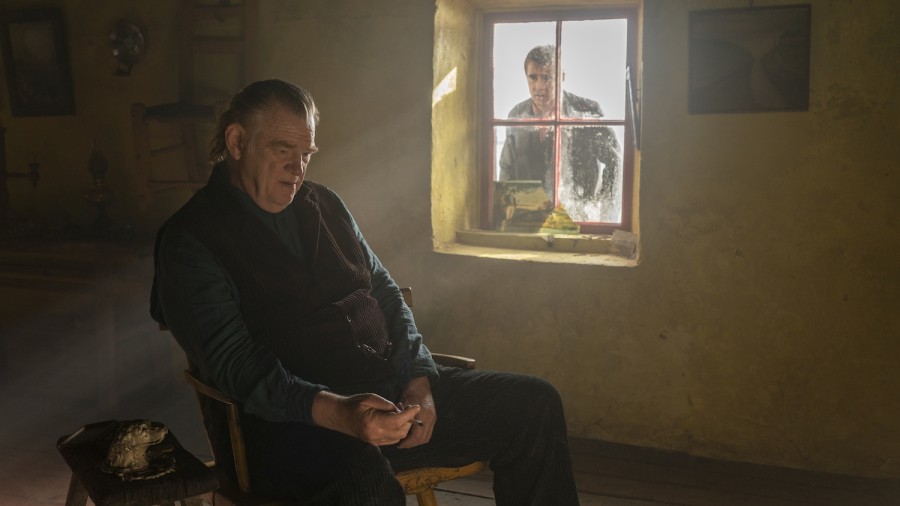Review: Martin McDonagh’s ‘The Banshees of Inisherin’ depicts heartbreak and existential despair hilariously
“The Banshees of Inisherin” is undoubtedly one of the best films of the year.
Set during the Irish Civil War, “The Banshees of Inisherin” follows a falling out between best friends Pádraic (Colin Farrell) and Colm (Brendan Gleeson). (Courtesy of Searchlight Pictures)
February 1, 2023
Written and directed by Martin McDonagh, “The Banshees of Inisherin” follows best friends Pádraic (Colin Farrell) and Colm (Brendan Gleeson) around an island off the coast of Ireland. Set in 1923 during the Irish Civil War, the film captures the painful end of a lifelong friendship. McDonagh cleverly allegorizes Pádraic and Colm’s abrupt falling out, comparing it with the internal and political conflicts of Ireland at the time. Ben Davis, through his photography and staging of rainbow skies and tranquil sunsets, beautifully and ironically captures the heartbreaking events that transpire throughout the film. Though only depicting a simple falling out between two friends, the film is a remarkable portrayal of existentialism, death and heartbreak.
Pádraic, an ordinary farmer who loves his donkey, always meets up with his friend Colm, a fiddle player and songwriter, for drinks at the pub. However, as Pádraic gleefully walks along the shores of Ireland one day, Colm does not respond to Pádraic’s invitation for a drink and stays home, smoking. He’s had enough of “aimless chatting,” and describes Pádraic as dull and limited. “I just don’t like you no more,” Colm says, to Pádraic’s dismay. They begin to argue, and what had been hilarious bickering between two characters becomes a melancholic and self-aware descent into tragedy.
With the belief that he has exactly 12 years left to live, Colm turns his back on kindness altogether — including the kindness characterizing his friendship with Pádraic — and chooses to focus solely on the legacy he will leave behind as a musician. In a state of despair, he confides in Pádraic’s scholarly sister Siobhán (Kerry Condon), who says that she understands his fear of conformity and his yearning for a more fulfilling life.
There’s an entirely different layer to Colm’s depression though, which is cemented by his blunt attitude toward Pádraic. “You can’t just all of a sudden stop being friends with a fella,” says Siobhán. Colm asks, “Why can’t I?” Siobhán responds, “Because it isn’t nice.”
The value of niceness within the context of legacy and life is questioned throughout the film, with Pádraic pointing out Colm’s vanity at every opportunity. This constant back-and-forth between the pair in the first half of the film, while somber, is executed with such elegance and charm that it becomes genuinely hilarious. The bickering, however, escalates to the point where Colm threatens to cut off one of his own fingers every time Pádraic speaks to him, driving the film into a grim hole of devastation. Composer Carter Burwell, famous for his work with the Coen brothers, elevates this melancholic tone with a subtle, delicate musical score.
McDonagh goes beyond the bombastic and stylized nature of his previous films — including with “In Bruges” and “Three Billboards Outside Ebbing, Missouri” — by crafting a heavily subdued and masterful comedic portrait of kindness and despair.
Contact Yezen Saadah at [email protected].
















































































































































